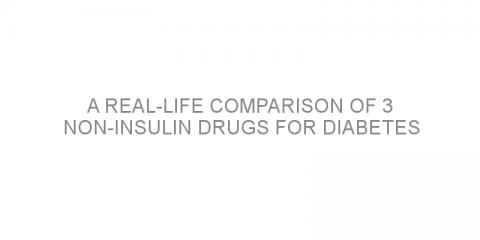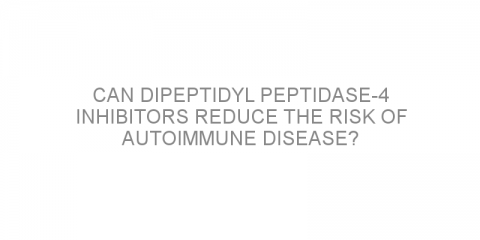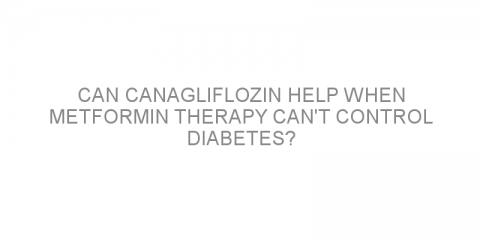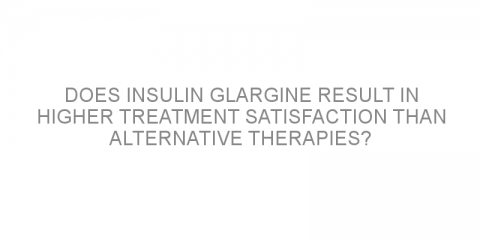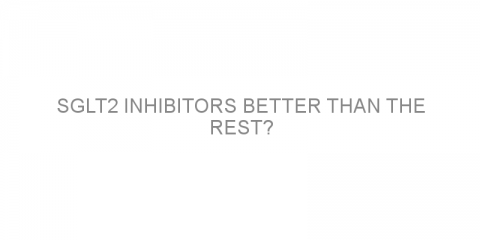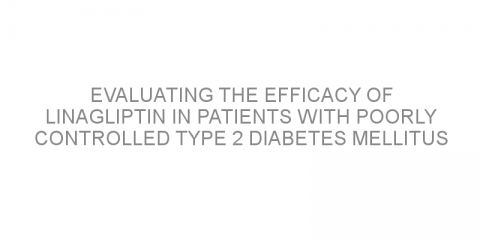In a nutshell The authors aimed to compare the effects of liraglutide (Victoza) to sitagliptin (Januvia) and exenatide (Byetta) in a real-life setting. Some background Glucagon-like peptide 1 (GLP-1) receptor agonists (liraglutide and exenatide) are drugs used in type 2 diabetes that increase insulin secretion to result in improved blood...
Read MoreAnti-diabetes medication(s)-Non-insulin oral drugs Posts on Medivizor
Can dipeptidyl peptidase-4 inhibitors reduce the risk of autoimmune disease?
In a nutshell The authors evaluated the risk of autoimmune disease development in patients starting a dipeptidyl peptidase inhibitor for type 2 diabetes. Some background Dipeptidyl peptidase-4 (DPP4) is a protein that plays a major role in glucose metabolism. DPP4-inhbitors such as linagliptin (Tradjenta), saxagliptin (Onglyza) and sitagliptin...
Read MoreCan canagliflozin help when metformin therapy can’t control diabetes?
In a nutshell The authors evaluated the effectiveness and safety of canagliflozin for type 2 diabetes that could not be controlled with metformin therapy. Some background Metformin (Glucophage) is a recommended first-line drug therapy for type 2 diabetes that decreases glucose production in the liver, increases insulin sensitivity and enhances...
Read MoreDoes insulin glargine result in higher treatment satisfaction than alternative therapies?
In a nutshell The authors aimed to assess patient-reported outcomes associated with initiating insulin glargine among insulin-naïve patients with type 2 diabetes mellitus. Some background While type 2 diabetes may initially be managed with diet, exercise and oral antidiabetic drugs, many patients will need to move to insulin therapy to...
Read MoreSGLT2 inhibitors better than the rest?
In a nutshell This article reviewed the risks and benefits of SGLT2 inhibitors such as dapagliflozin (Forxiga) and canagliflozin (Invokana) in the treatment of type 2 diabetes mellitus (T2DM). Some background SGLT2 inhibitors are a newly developed class of anti-diabetes drugs that cause more glucose to be eliminated from the blood...
Read MoreIs dapagliflozin add-on therapy beneficial?
In a nutshell This trial evaluated the efficacy of dapagliflozin (Forxiga) in patients with type 2 diabetes mellitus (T2DM) uncontrolled with sitagliptin (Januvia), with or without metformin (Glucophage). Some background T2DM is a condition in which the cells of the body are failing to use insulin properly (insulin resistance), resulting in...
Read MoreEvaluating the efficacy of linagliptin in patients with poorly controlled type 2 diabetes mellitus
In a nutshell This study assessed the efficacy and safety of linagliptin (Tradjenta) for the treatment of patients with uncontrolled type 2 diabetes mellitus (T2DM). Some background Patients with T2DM have high blood glucose levels (hyperglycemia) caused by insulin resistance (the cells of the body fail to respond to the normal actions of the...
Read MoreDapagliflozin for glycemic control in type 2 diabetic patients
In a nutshell In this study, researchers compared dapagliflozin (forxiga) to a placebo to assess how well dapagliflozin controls blood sugar levels and body weight in type 2 diabetes (T2D) patients whose disease is not well-controlled by the drug metformin (glucophage). Some background To maintain optimal health, T2D patients’ blood sugar...
Read MoreComparing the effects of vildagliptin and glimepiride on glucose fluctuations in patients with type 2 diabetes mellitus.
In a nutshell This study compared the effects of vildagliptin (Zomelis) and glimepiride (Amaryl) on the rise and fall of blood glucose levels (glucose fluctuations) in patients with type 2 diabetes mellitus (T2DM). Some background Patients with T2DM do not produce enough insulin (or are resistant to insulin) necessary to properly use the...
Read MoreDipeptidyl peptidase-4 inhibitors are slightly less effective than metformin in the management of type 2 diabetes, but cause fewer adverse events
In a nutshell In this study researchers compared the effects, and side effects, of DPP-4 inhibitors and metformin when used as first therapy for type 2 diabetes. The effects of drug treatments were reviewed when these drugs were given together (called combination therapy), or alone (called monotherapy). Some background Dipeptidyl peptidase-4...
Read MoreComparing the effects of exenatide versus glimepiride in achieving glycaemic control in patients with type 2 diabetes mellitus poorly controlled with metformin
In a nutshell This study compared the efficacy and safety of exenatide versus glimepiride in achieving glycaemic (blood sugar) control in patients with type 2 diabetes mellitus (T2DM) uncontrolled by metformin. Some background T2DM is a condition in which patients have high blood sugar levels (hyperglycemia). Metformin (Glucophage) is the...
Read MoreExanatide versus premixed insulin aspart 70/30 in controlling hypoglycemia and weight-gain in metformin-treated patients with type 2 diabetes mellitus
In a nutshell The aim of this study was to evaluate the efficacy and safety of exanatide compared to premixed insulin aspart (PIA) 70/30 in metformin-treated patients with type 2 diabetes mellitus (T2DM). The main findings were that exanatide was as good as PIA 70/30 for blood sugar control and was associated with less risk of side effects. Some...
Read More
